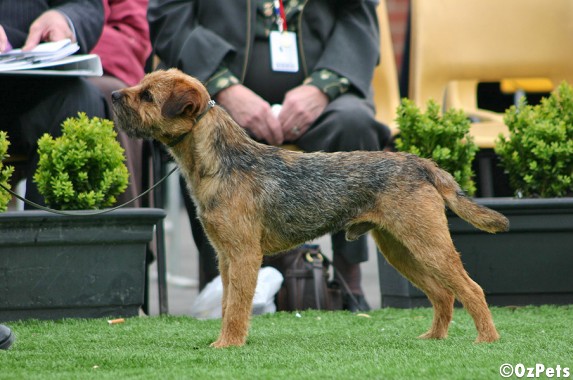
THE BORDER TERRIER This breed takes its name from the border separating England and Scotland, and it was in the Cheviot Hill area where the breed type was established. The local farmers needed a dog whose legs were long enough to follow a horse all day but short enough to trail a fox into its burrow and carrying a coat dense enough to handle cold wet weather. It is believe the progenitors of this breed were Dandie Dinmonts, Lakeland and Bedlington Terriers - and this mixture would certainly account for the variety of colours found in the Border Terrier.
This breed takes its name from the border separating England and Scotland, and it was in the Cheviot Hill area where the breed type was established. The local farmers needed a dog whose legs were long enough to follow a horse all day but short enough to trail a fox into its burrow and carrying a coat dense enough to handle cold wet weather. It is believe the progenitors of this breed were Dandie Dinmonts, Lakeland and Bedlington Terriers - and this mixture would certainly account for the variety of colours found in the Border Terrier.
Characteristics and Care
Border Terriers must have immense stamina and be prepared to follow horses all day. They must be quick on their feet and able to look after themselves in all circumstances - this, however, does not mean they are troublemakers or aggressive. Borders have a strong respect for their owners and harsh treatment can wreck their trust forever. The coat is very easy to maintain - the harsh hair repels dirt and a quick shake will free the dog from water. Occasional brushing keeps the skin and coat in a good condition. They are ideal family dogs and while they enjoy the open spaces and plenty of exercise, they are quite at home in a smaller domestic situation.
General Appearance
Shoulder height: Approx. 29 - 40cm (11-1/2"- 15-1/2").
Colour: Red, wheaten, grizzle or blue/tan.
Coat: Outercoat to be harsh and dense with a thick undercoat and skin.
Gait: Fore and hindlegs move straight and effortlessly.
Soundness is essential as these dogs must be able to follow a horse all day. Gameness and activity are the hallmarks of Border Terriers. Their otter-shaped heads must be broad with shorter strong muzzles and ears that drop forward close to the cheek framing the face. A well developed chest providing ample room for the heart and lungs, and a body that is longer than that of the Lakeland or Fox Terrier. The tail set is lower than the topline and like so many terriers with origins in Scotland, the tail should not be docked.